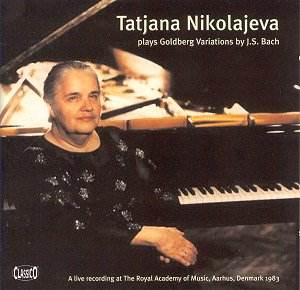Goldberg Variations Comparison
Nikolayeva/Hyperion (rec. 1992 - 79:38)
The legendary Russian
pianist Tatiana Nikolayeva (1924-1993)
is best known for her performances of
the Bach, Beethoven, and Shostakovich
keyboard works. In fact, she was responsible
for Shostakovich's Preludes and Fugues
Op. 87 being accepted for publication
by the Russian Ministry of Culture.
A champion for the music of Bach and
Shostakovich, Nikolayeva also frequently
performed piano music of the Romantic
era as well as modern Russian music.
That she had time for frequent concertizing
throughout the world and teaching at
the Moscow Conservatory is remarkable
given that she had a son to raise on
her own and also took full-time responsibility
for her younger brother who had Downs
Syndrome. Nikolayeva's life is a testament
to fortitude, loyalty and high art;
the world of classical music is surely
diminished through her absence. Perhaps
her greatest legacy is her three recordings
of the Shostakovich Opus 87 Preludes
and Fugues where she is the undisputed
master of this body of music.
The genesis of the
CLASSICO recording derives from the
master classes Nikolayeva held in April
1983 at the Royal Academy of Music in
Aarhus. On the final day of classes,
she gave a concert playing the Goldberg
Variations and an encore from a chorale
of BWV 147. It is reported that the
'standing room only' audience was totally
captivated by the concert, but copyright
and other issues dictated that a recording
of the event not be released. However,
a former student of Nikolayeva named
Sergei Senkov knew and talked to Nikolayeva's
son who finally agreed to the release
of the performance.
As noted above in the
heading, Nikolayeva already has a Goldberg
Variations recording that she made for
Hyperion just one year before her death.
It is a fine set of performances, but
can safely be retired in favor of the
1983 live interpretation. In the live
performance, Nikolayeva is more vibrant
and displays greater technical command.
Her frequent changes in tempo and dynamics
sound perfectly natural while the 1992
performance has a contrived and somewhat
choppy demeanor. Concerning sound quality,
the Hyperion studio recording is rather
constricted compared to the wide-ranging
Classico soundstage. However, I should
add that the ClassicO sound can get
a bit brittle and unpleasant in the
higher registers.
'Insistent' is the
word that comes to mind each time I
listen to Nikolayeva's Goldberg Variations,
and some might feel that she hectors
her listeners. Nikolayeva rarely sounds
at peace, always ready to pounce on
phrases. Yet, she makes it work in a
convincing manner through her intuitive
musicality.
I generally find that
the most rewarding performances of a
frequently recorded work are out of
the mainstream yet make me feel that
the work should be played no other way.
That sums up my views of Nikolayeva's
interpretations. Although she often
is hard when I expect to be nourished,
the results are so natural that I temporarily
switch my emotional preferences.
Here are some further
comments I noted while listening:
Opening Aria - Although
I've mentioned the pointed insistence
of Nikolayeva's overall performance,
you won't get any of it in her Aria.
She is totally comforting and warm,
enveloping humankind within her outstretched
arms. I do suggest readers luxuriate
in Nikolayeva's security, because there
isn't much more of it as the performance
advances.
Exuberance - Nikolayeva
is not particularly noted for her exuberance,
but she does a splendid job of it in
the Goldberg Variations. Although slowish
in the fast and exciting variations,
she makes up for it through highly demonstrative
readings with pin-point articulation
such as in the 1st and 3rd Variations.
Dialogue - Highlighting
the musical lines and conversational
properties of a work is one of the reasons
Nikolayeva is a treasured artist, and
she does not disappoint in her 1983
performance. This feature is most compelling
in the 6th Variation with its continuous
up-down rhythmic patterns from both
the upper and lower voices. In addition
to the delicious dialogue, Nikolayeva
employs frequent tempo changes that
expand the emotional palette of the
piece.
Despair - A review
of a recording of the Goldberg Variations
is not complete without commentary on
how well the pianist conveys the human
despair of Variations 15, 21, and 25
(Black Pearl). These are Nikolayeva's
most compelling interpretations and
almost painful to listen to. In the
"Black Pearl" Variation, her stark and
desolate environment is a 'black hole'
portraying the abyss of the soul.
Encore - Nikolayeva
plays the chorale from the Cantata BWV
147 excellently, but I feel that the
original version is superior for its
vocal contributions. Overall, the inclusion
of the encore is not a significant factor
in deciding whether or not to acquire
the disc.
In conclusion, anyone
interested in Tatiana Nikolayeva's way
with the Goldberg Variations is urged
to acquire the live 1983 performance.
It is one of the more rewarding piano
versions on the market and much preferred
to the 1992 studio performance on Hyperion.
I also urge readers to investigate other
Nikolayeva recordings including her
Beethoven Piano Sonata cycle on Olympia
and the two recordings currently available
(Hyperion and Regis) of her interpretations
of the Shostakovich Opus 87 Preludes
and Fugues.
Don Satz


